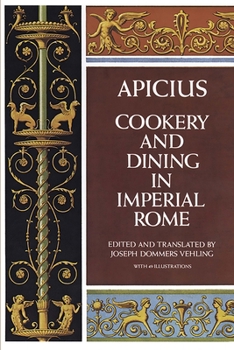Cookery and Dining in Imperial Rome
Select Format
Select Condition 
Book Overview
This is the first English translation of Apicius de re Coquinaria , the oldest known cookbook in existence. It is also one of the few translations of this original Roman cookbook prepared by a professional chef. Joseph Vehling's brilliant translation, extended introduction, and full and helpful commentary combine to bring you a clear picture of what foods the Romans ate, how they prepared them, and the highly developed state of culinary arts in Imperial...
Format:Paperback
Language:English
ISBN:0486235637
ISBN13:9780486235639
Release Date:June 1977
Publisher:Dover Publications
Length:320 Pages
Weight:0.97 lbs.
Dimensions:0.6" x 6.2" x 9.2"
Customer Reviews
5 ratings
A thorough translation by a professional chef / latin scholar, the definitive edition of this book
Published by Petros , 4 years ago
Dommers Vehling was a widely renowned chef, author of cookbooks and gastronomical public speaker of the early 20th century. He was also a Latin scholar and translated this work from various medieval transcriptions; the translation here is concise and mentions many discrepancies between the source texts while not substituting for the obscure original ingredients like other translations do. This is not a practical cookbook per se, as there are no exact quantities given and the recipes are presented directly from the Latin, unabridged and often incoherent.
Probably the best parts of this are Vehling's annotations- somewhat informal and personal, yet still scholarly. Overall a very easy read and true to the original texts. It is interesting even from a non-culinary standpoint; the work is written in native English as well and is not translated.
great for history buffs
Published by Thriftbooks.com User , 16 years ago
although more modern works have appeared this Edition is good for those (like myself) on a budget.
tangential comment
Published by Thriftbooks.com User , 18 years ago
I haven't read the book, so I'm giving it the benefit of the doubt with five stars. I just wanted to comment briefly on the whole A.D. / C.E. controversy. First, A.D. stands for Anno Domini, not "After Death" - the Christ is said to have died in 33 A.D., not 0 A.D. Second, the "Common Era" designation is nothing but a euphemism, and as such I find it hard to understand how it can be deemed an "improvement" over the A.D. designation - when you use the "C.E." designation, you're still taking the alleged year of the birth of Christ as your chronological reference point. In other words, this "Common Era" verbiage is pure window dressing. Those with a proclivity for pointless euphemisms are of course free to identify their dates under the C.E. system - just don't be too self-righteous about it.
Worth a read, if you actually want to prepare the recipes.
Published by Thriftbooks.com User , 20 years ago
The book I have to say are decent and the recipes, defiantely reproducable, if you are looking for a cookbook then this is your book, if for some crazy hobby of trying to cook with ingredients impossible to get then this is not your book. The author adds or omits ingredients that you would simply not find, anywhere, even Sicily, promise. The dishes are close to true and if you are interested in Sicilian cooking you get a very different perspective. Try reading Pomp and Sustenance after this book and you will see what I mean. As for the "Christian" zealots in the other reviews, get a life, please, from the Roman point of view it is CE, AD is just so narrow minded, and take a look around we are not the only people on this earth.
Worth a Read
Published by Thriftbooks.com User , 23 years ago
While others who have commented on the book take the author/translator to task for substitutions, mistranslations and other faults, I found that by and large the redactions were not terribly different from others I have read. These include several versions, so I am aquainted with Apicius and his recipes and have tried quite a few, and not from just one source.What I find most praiseworthy about this book is Dommers Vehling's obvious interest in gastronomy in general and in ancient cookery in particular. He makes a fairly honest attempt to fill in some of the background for the reader. And although he may be guilty of having his own point of view, we must remember that he was writing over sixty years ago.Dommers also gives the Latin names of the recipes, makes comments on many of them and makes references to other translattions of Apicius' De Re Coquinaria.And so I feel that this book is worth reading, especially for the price.






